Leadership and Management for Service Industries - Premier Inn
VerifiedAdded on 2023/01/09
|15
|3643
|96
Report
AI Summary
This report provides a comprehensive overview of leadership and management principles within the service industry, with a specific focus on the hospitality sector and the Premier Inn hotel chain. It begins by examining classical management theories, including those of Fayol, Taylor, behavioral theory, and contingency theory, and their relevance to the hospitality context. The report then delves into organizational structures, such as functional, centralized, decentralized, divisional, matrix, and process-based structures, and how they impact the industry. It explores organizational culture, including Handy's framework, and differentiates between management and leadership roles. Leadership and management styles are discussed, with a focus on democratic, autocratic, strategic, and laissez-faire approaches. The report analyzes Premier Inn's current leadership style, which combines democratic and visionary elements, and suggests the integration of strategic management for further improvement. Furthermore, it assesses internal and external factors that influence talent management within Premier Inn, using a talent management model. Finally, it highlights the hard and soft skills essential for current and future leadership in the service sector.
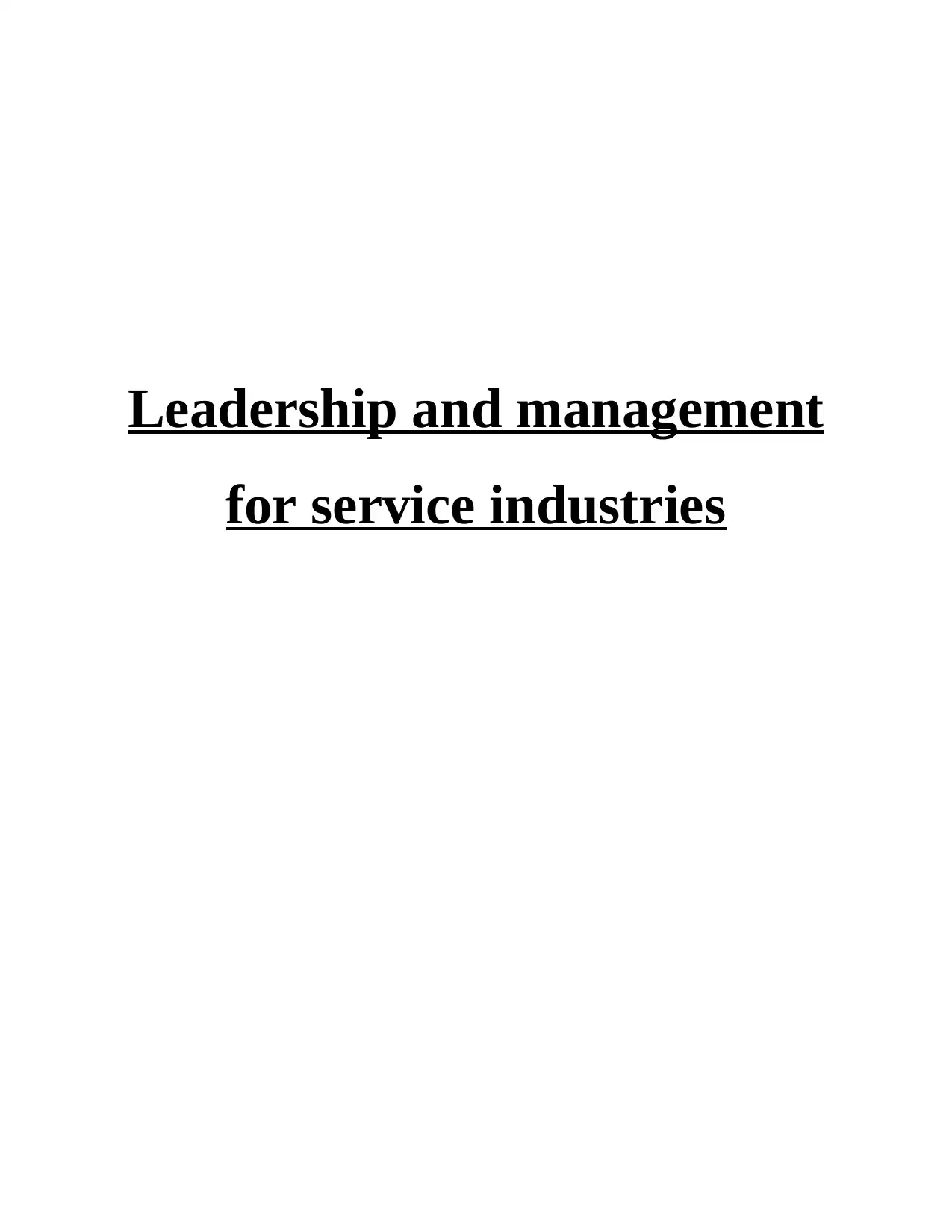
Leadership and management
for service industries
for service industries
Paraphrase This Document
Need a fresh take? Get an instant paraphrase of this document with our AI Paraphraser
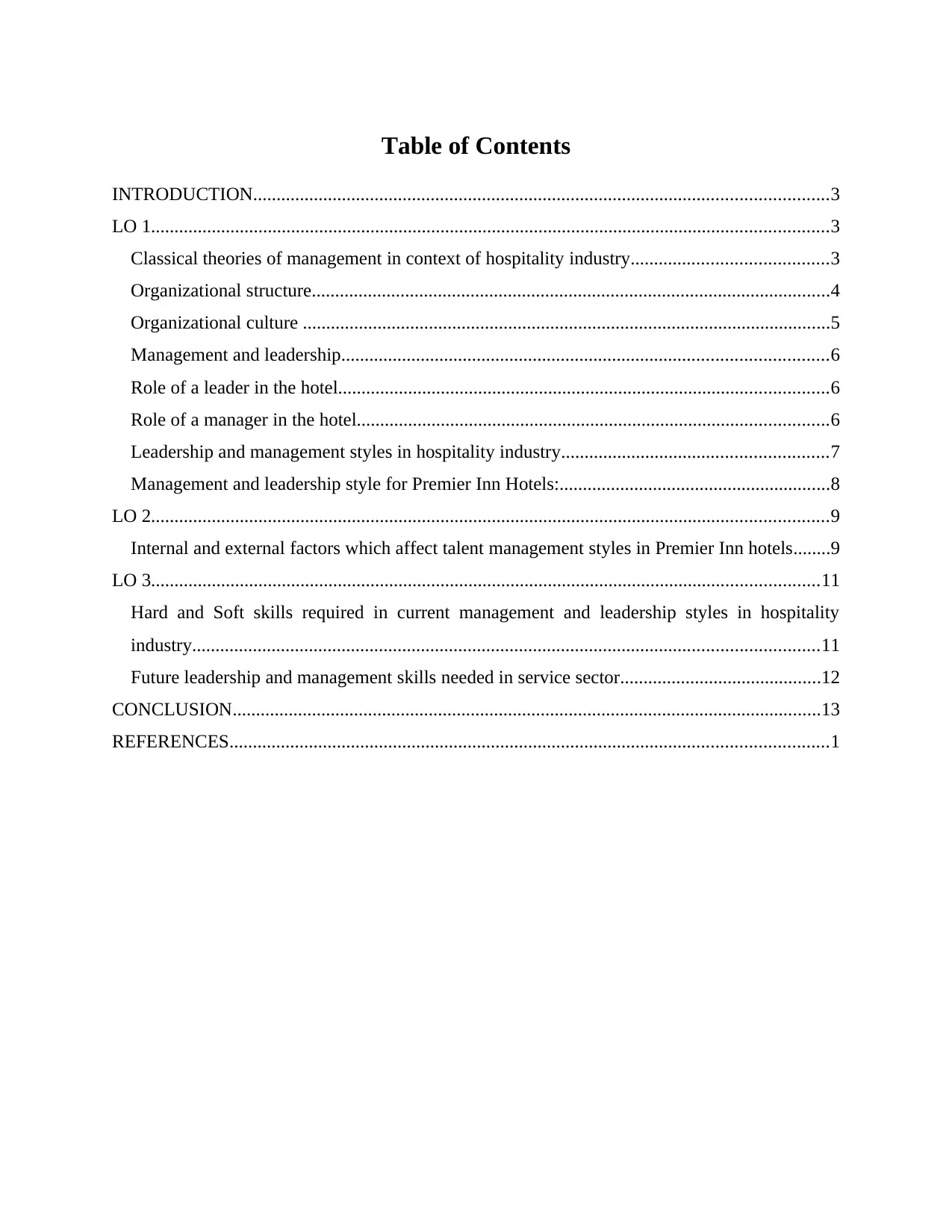
Table of Contents
INTRODUCTION...........................................................................................................................3
LO 1.................................................................................................................................................3
Classical theories of management in context of hospitality industry..........................................3
Organizational structure...............................................................................................................4
Organizational culture .................................................................................................................5
Management and leadership........................................................................................................6
Role of a leader in the hotel.........................................................................................................6
Role of a manager in the hotel.....................................................................................................6
Leadership and management styles in hospitality industry.........................................................7
Management and leadership style for Premier Inn Hotels:..........................................................8
LO 2.................................................................................................................................................9
Internal and external factors which affect talent management styles in Premier Inn hotels........9
LO 3...............................................................................................................................................11
Hard and Soft skills required in current management and leadership styles in hospitality
industry......................................................................................................................................11
Future leadership and management skills needed in service sector...........................................12
CONCLUSION..............................................................................................................................13
REFERENCES................................................................................................................................1
INTRODUCTION...........................................................................................................................3
LO 1.................................................................................................................................................3
Classical theories of management in context of hospitality industry..........................................3
Organizational structure...............................................................................................................4
Organizational culture .................................................................................................................5
Management and leadership........................................................................................................6
Role of a leader in the hotel.........................................................................................................6
Role of a manager in the hotel.....................................................................................................6
Leadership and management styles in hospitality industry.........................................................7
Management and leadership style for Premier Inn Hotels:..........................................................8
LO 2.................................................................................................................................................9
Internal and external factors which affect talent management styles in Premier Inn hotels........9
LO 3...............................................................................................................................................11
Hard and Soft skills required in current management and leadership styles in hospitality
industry......................................................................................................................................11
Future leadership and management skills needed in service sector...........................................12
CONCLUSION..............................................................................................................................13
REFERENCES................................................................................................................................1
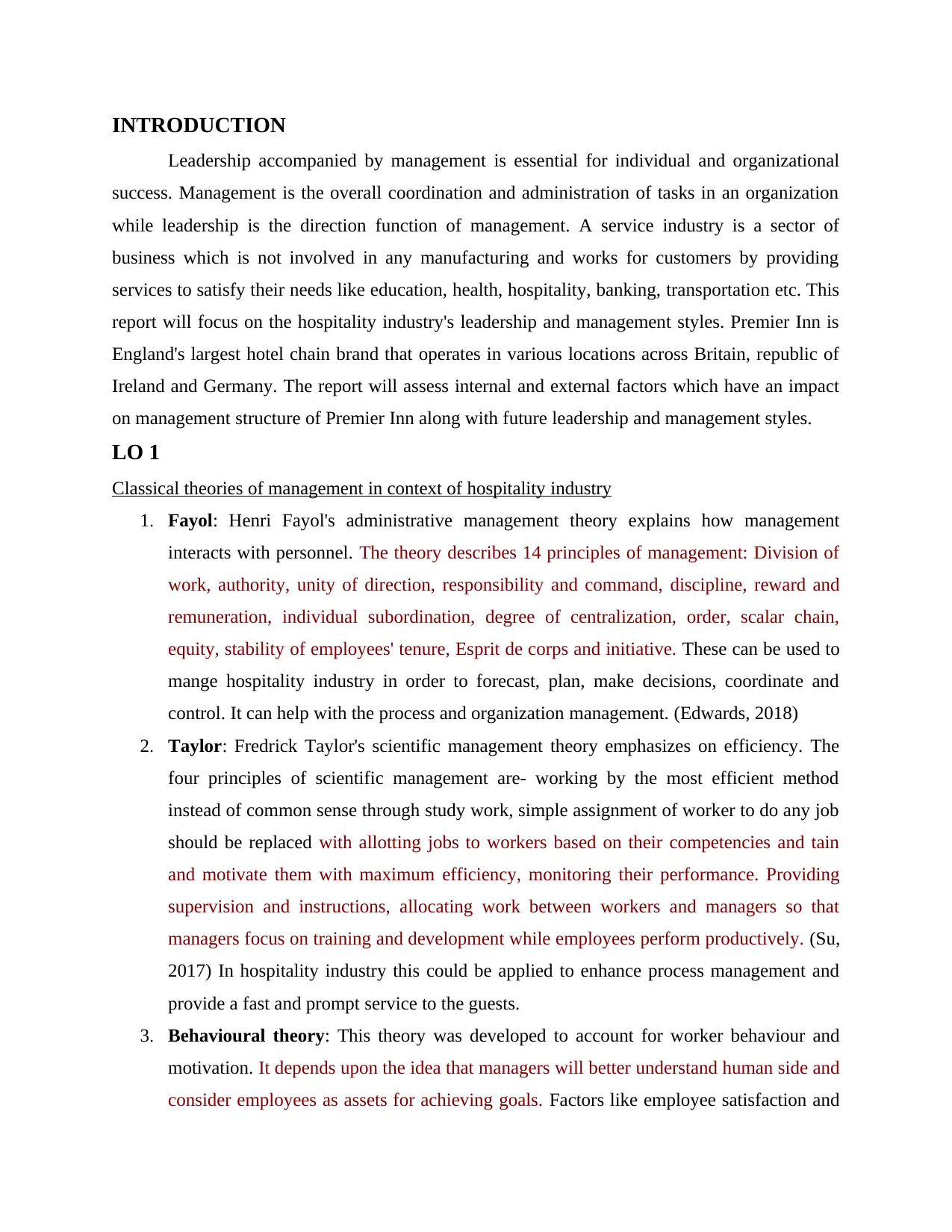
INTRODUCTION
Leadership accompanied by management is essential for individual and organizational
success. Management is the overall coordination and administration of tasks in an organization
while leadership is the direction function of management. A service industry is a sector of
business which is not involved in any manufacturing and works for customers by providing
services to satisfy their needs like education, health, hospitality, banking, transportation etc. This
report will focus on the hospitality industry's leadership and management styles. Premier Inn is
England's largest hotel chain brand that operates in various locations across Britain, republic of
Ireland and Germany. The report will assess internal and external factors which have an impact
on management structure of Premier Inn along with future leadership and management styles.
LO 1
Classical theories of management in context of hospitality industry
1. Fayol: Henri Fayol's administrative management theory explains how management
interacts with personnel. The theory describes 14 principles of management: Division of
work, authority, unity of direction, responsibility and command, discipline, reward and
remuneration, individual subordination, degree of centralization, order, scalar chain,
equity, stability of employees' tenure, Esprit de corps and initiative. These can be used to
mange hospitality industry in order to forecast, plan, make decisions, coordinate and
control. It can help with the process and organization management. (Edwards, 2018)
2. Taylor: Fredrick Taylor's scientific management theory emphasizes on efficiency. The
four principles of scientific management are- working by the most efficient method
instead of common sense through study work, simple assignment of worker to do any job
should be replaced with allotting jobs to workers based on their competencies and tain
and motivate them with maximum efficiency, monitoring their performance. Providing
supervision and instructions, allocating work between workers and managers so that
managers focus on training and development while employees perform productively. (Su,
2017) In hospitality industry this could be applied to enhance process management and
provide a fast and prompt service to the guests.
3. Behavioural theory: This theory was developed to account for worker behaviour and
motivation. It depends upon the idea that managers will better understand human side and
consider employees as assets for achieving goals. Factors like employee satisfaction and
Leadership accompanied by management is essential for individual and organizational
success. Management is the overall coordination and administration of tasks in an organization
while leadership is the direction function of management. A service industry is a sector of
business which is not involved in any manufacturing and works for customers by providing
services to satisfy their needs like education, health, hospitality, banking, transportation etc. This
report will focus on the hospitality industry's leadership and management styles. Premier Inn is
England's largest hotel chain brand that operates in various locations across Britain, republic of
Ireland and Germany. The report will assess internal and external factors which have an impact
on management structure of Premier Inn along with future leadership and management styles.
LO 1
Classical theories of management in context of hospitality industry
1. Fayol: Henri Fayol's administrative management theory explains how management
interacts with personnel. The theory describes 14 principles of management: Division of
work, authority, unity of direction, responsibility and command, discipline, reward and
remuneration, individual subordination, degree of centralization, order, scalar chain,
equity, stability of employees' tenure, Esprit de corps and initiative. These can be used to
mange hospitality industry in order to forecast, plan, make decisions, coordinate and
control. It can help with the process and organization management. (Edwards, 2018)
2. Taylor: Fredrick Taylor's scientific management theory emphasizes on efficiency. The
four principles of scientific management are- working by the most efficient method
instead of common sense through study work, simple assignment of worker to do any job
should be replaced with allotting jobs to workers based on their competencies and tain
and motivate them with maximum efficiency, monitoring their performance. Providing
supervision and instructions, allocating work between workers and managers so that
managers focus on training and development while employees perform productively. (Su,
2017) In hospitality industry this could be applied to enhance process management and
provide a fast and prompt service to the guests.
3. Behavioural theory: This theory was developed to account for worker behaviour and
motivation. It depends upon the idea that managers will better understand human side and
consider employees as assets for achieving goals. Factors like employee satisfaction and
⊘ This is a preview!⊘
Do you want full access?
Subscribe today to unlock all pages.

Trusted by 1+ million students worldwide
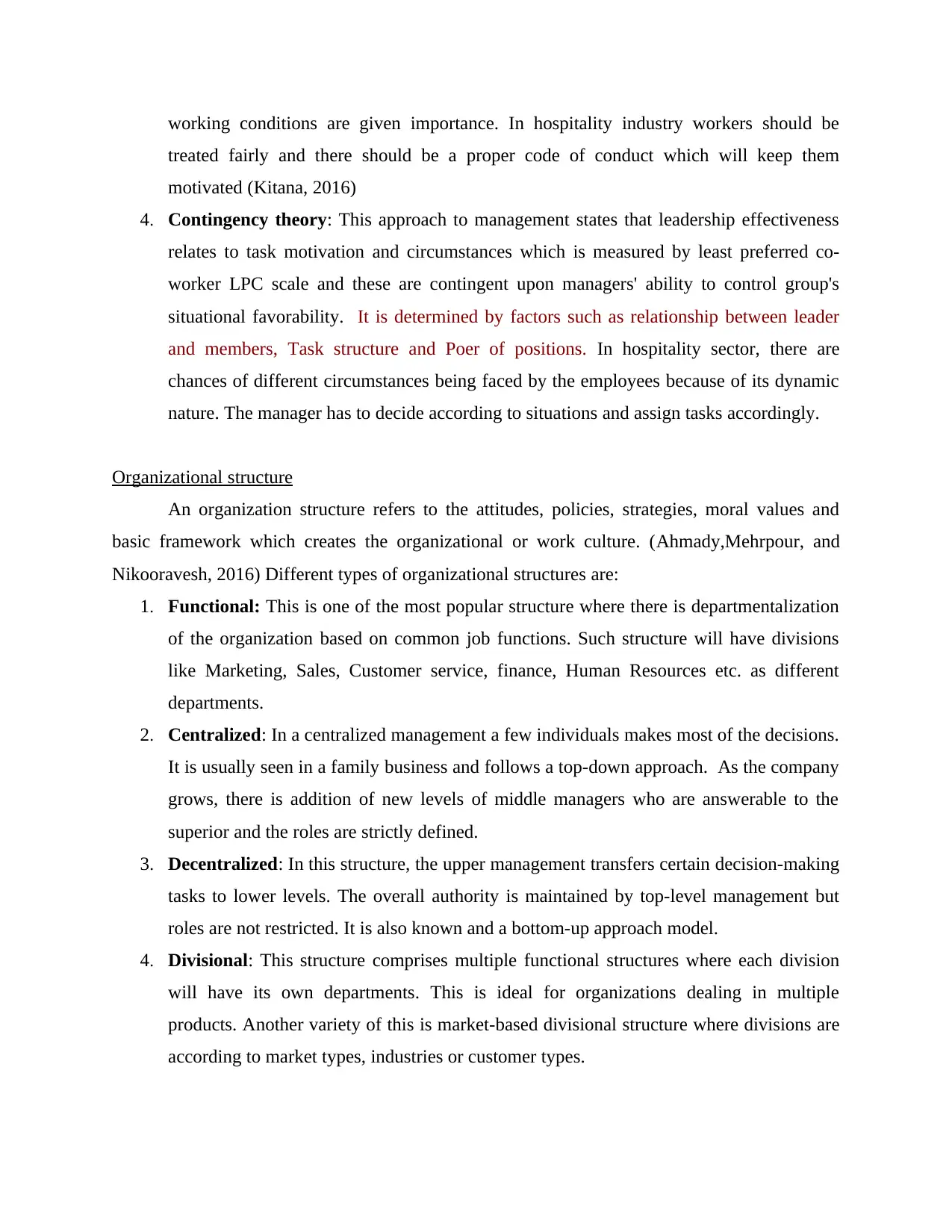
working conditions are given importance. In hospitality industry workers should be
treated fairly and there should be a proper code of conduct which will keep them
motivated (Kitana, 2016)
4. Contingency theory: This approach to management states that leadership effectiveness
relates to task motivation and circumstances which is measured by least preferred co-
worker LPC scale and these are contingent upon managers' ability to control group's
situational favorability. It is determined by factors such as relationship between leader
and members, Task structure and Poer of positions. In hospitality sector, there are
chances of different circumstances being faced by the employees because of its dynamic
nature. The manager has to decide according to situations and assign tasks accordingly.
Organizational structure
An organization structure refers to the attitudes, policies, strategies, moral values and
basic framework which creates the organizational or work culture. (Ahmady,Mehrpour, and
Nikooravesh, 2016) Different types of organizational structures are:
1. Functional: This is one of the most popular structure where there is departmentalization
of the organization based on common job functions. Such structure will have divisions
like Marketing, Sales, Customer service, finance, Human Resources etc. as different
departments.
2. Centralized: In a centralized management a few individuals makes most of the decisions.
It is usually seen in a family business and follows a top-down approach. As the company
grows, there is addition of new levels of middle managers who are answerable to the
superior and the roles are strictly defined.
3. Decentralized: In this structure, the upper management transfers certain decision-making
tasks to lower levels. The overall authority is maintained by top-level management but
roles are not restricted. It is also known and a bottom-up approach model.
4. Divisional: This structure comprises multiple functional structures where each division
will have its own departments. This is ideal for organizations dealing in multiple
products. Another variety of this is market-based divisional structure where divisions are
according to market types, industries or customer types.
treated fairly and there should be a proper code of conduct which will keep them
motivated (Kitana, 2016)
4. Contingency theory: This approach to management states that leadership effectiveness
relates to task motivation and circumstances which is measured by least preferred co-
worker LPC scale and these are contingent upon managers' ability to control group's
situational favorability. It is determined by factors such as relationship between leader
and members, Task structure and Poer of positions. In hospitality sector, there are
chances of different circumstances being faced by the employees because of its dynamic
nature. The manager has to decide according to situations and assign tasks accordingly.
Organizational structure
An organization structure refers to the attitudes, policies, strategies, moral values and
basic framework which creates the organizational or work culture. (Ahmady,Mehrpour, and
Nikooravesh, 2016) Different types of organizational structures are:
1. Functional: This is one of the most popular structure where there is departmentalization
of the organization based on common job functions. Such structure will have divisions
like Marketing, Sales, Customer service, finance, Human Resources etc. as different
departments.
2. Centralized: In a centralized management a few individuals makes most of the decisions.
It is usually seen in a family business and follows a top-down approach. As the company
grows, there is addition of new levels of middle managers who are answerable to the
superior and the roles are strictly defined.
3. Decentralized: In this structure, the upper management transfers certain decision-making
tasks to lower levels. The overall authority is maintained by top-level management but
roles are not restricted. It is also known and a bottom-up approach model.
4. Divisional: This structure comprises multiple functional structures where each division
will have its own departments. This is ideal for organizations dealing in multiple
products. Another variety of this is market-based divisional structure where divisions are
according to market types, industries or customer types.
Paraphrase This Document
Need a fresh take? Get an instant paraphrase of this document with our AI Paraphraser
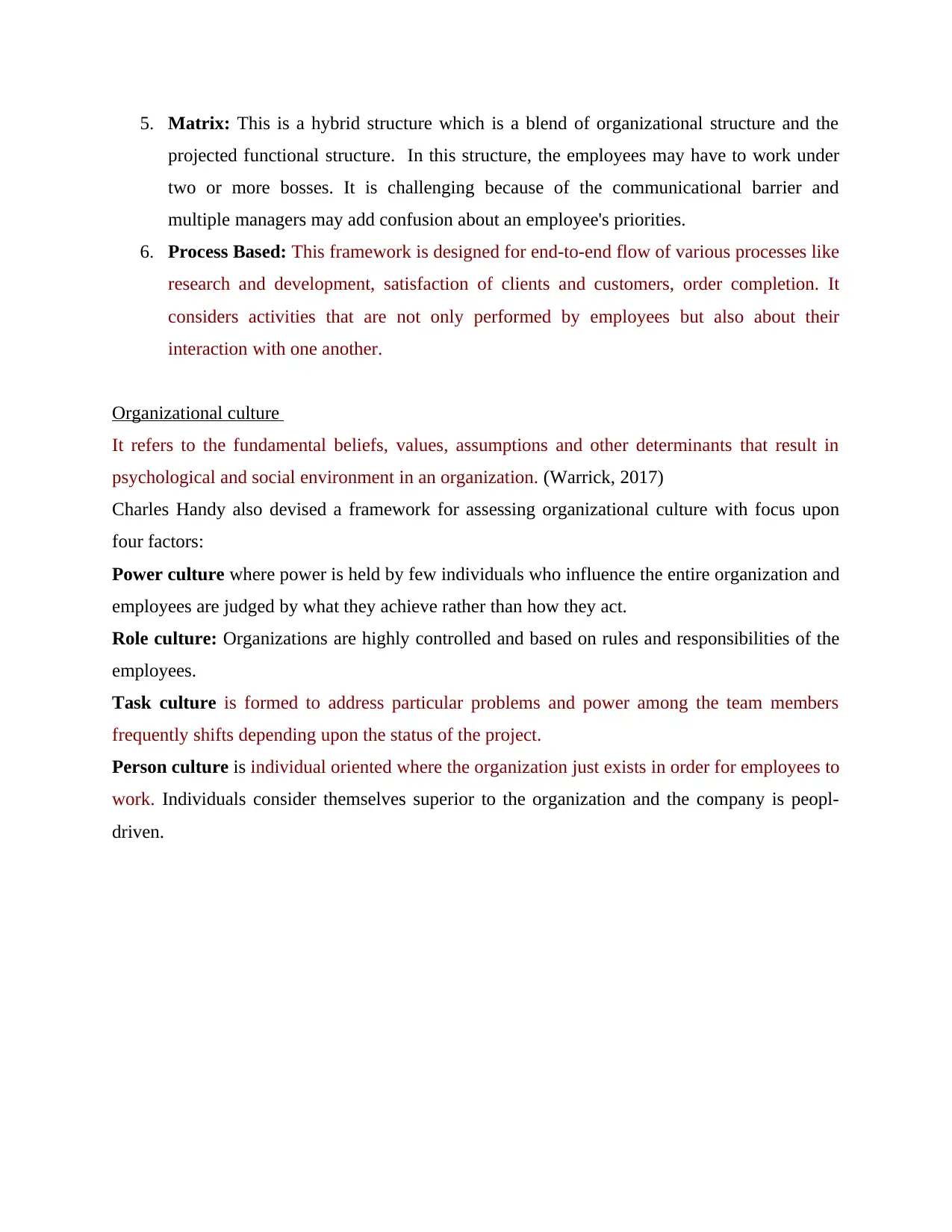
5. Matrix: This is a hybrid structure which is a blend of organizational structure and the
projected functional structure. In this structure, the employees may have to work under
two or more bosses. It is challenging because of the communicational barrier and
multiple managers may add confusion about an employee's priorities.
6. Process Based: This framework is designed for end-to-end flow of various processes like
research and development, satisfaction of clients and customers, order completion. It
considers activities that are not only performed by employees but also about their
interaction with one another.
Organizational culture
It refers to the fundamental beliefs, values, assumptions and other determinants that result in
psychological and social environment in an organization. (Warrick, 2017)
Charles Handy also devised a framework for assessing organizational culture with focus upon
four factors:
Power culture where power is held by few individuals who influence the entire organization and
employees are judged by what they achieve rather than how they act.
Role culture: Organizations are highly controlled and based on rules and responsibilities of the
employees.
Task culture is formed to address particular problems and power among the team members
frequently shifts depending upon the status of the project.
Person culture is individual oriented where the organization just exists in order for employees to
work. Individuals consider themselves superior to the organization and the company is peopl-
driven.
projected functional structure. In this structure, the employees may have to work under
two or more bosses. It is challenging because of the communicational barrier and
multiple managers may add confusion about an employee's priorities.
6. Process Based: This framework is designed for end-to-end flow of various processes like
research and development, satisfaction of clients and customers, order completion. It
considers activities that are not only performed by employees but also about their
interaction with one another.
Organizational culture
It refers to the fundamental beliefs, values, assumptions and other determinants that result in
psychological and social environment in an organization. (Warrick, 2017)
Charles Handy also devised a framework for assessing organizational culture with focus upon
four factors:
Power culture where power is held by few individuals who influence the entire organization and
employees are judged by what they achieve rather than how they act.
Role culture: Organizations are highly controlled and based on rules and responsibilities of the
employees.
Task culture is formed to address particular problems and power among the team members
frequently shifts depending upon the status of the project.
Person culture is individual oriented where the organization just exists in order for employees to
work. Individuals consider themselves superior to the organization and the company is peopl-
driven.
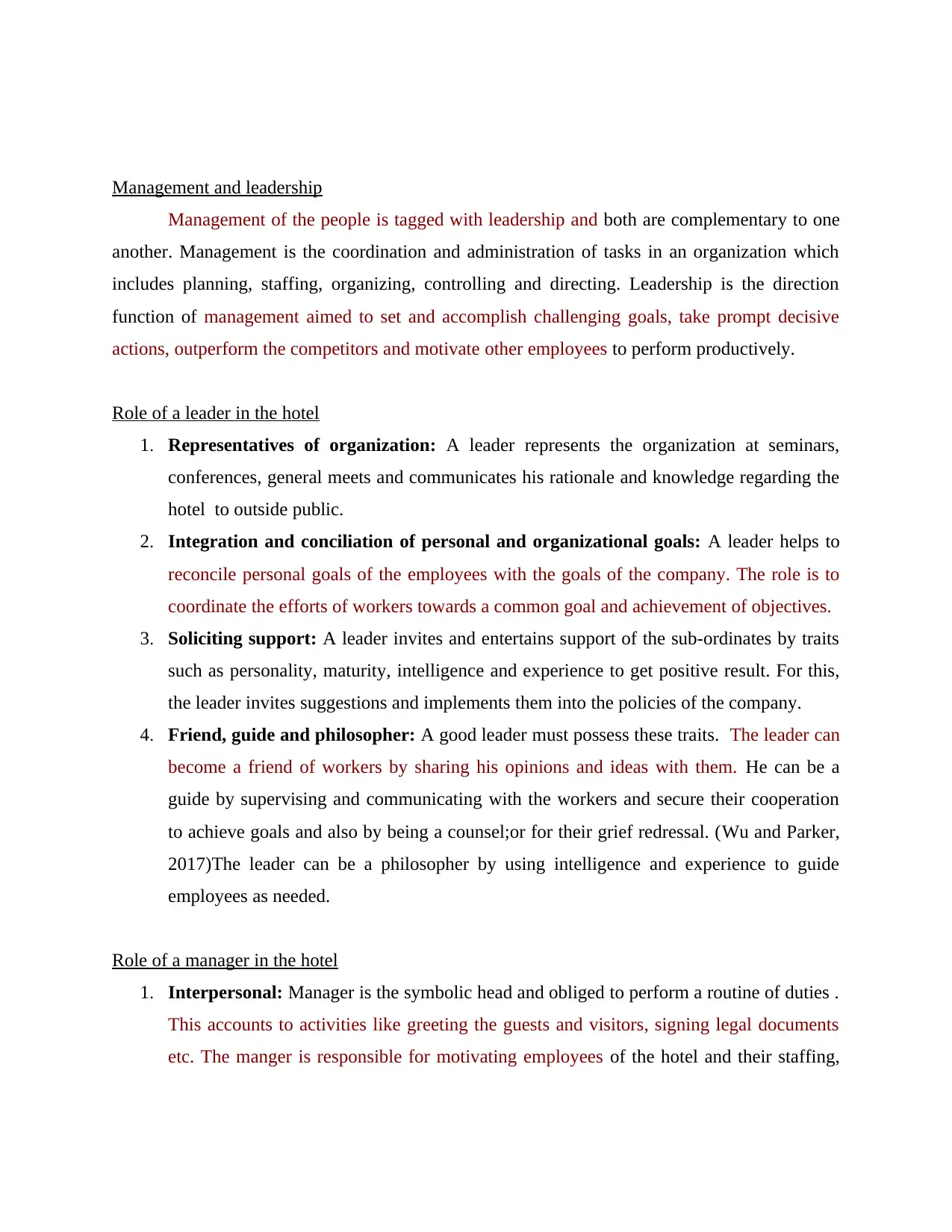
Management and leadership
Management of the people is tagged with leadership and both are complementary to one
another. Management is the coordination and administration of tasks in an organization which
includes planning, staffing, organizing, controlling and directing. Leadership is the direction
function of management aimed to set and accomplish challenging goals, take prompt decisive
actions, outperform the competitors and motivate other employees to perform productively.
Role of a leader in the hotel
1. Representatives of organization: A leader represents the organization at seminars,
conferences, general meets and communicates his rationale and knowledge regarding the
hotel to outside public.
2. Integration and conciliation of personal and organizational goals: A leader helps to
reconcile personal goals of the employees with the goals of the company. The role is to
coordinate the efforts of workers towards a common goal and achievement of objectives.
3. Soliciting support: A leader invites and entertains support of the sub-ordinates by traits
such as personality, maturity, intelligence and experience to get positive result. For this,
the leader invites suggestions and implements them into the policies of the company.
4. Friend, guide and philosopher: A good leader must possess these traits. The leader can
become a friend of workers by sharing his opinions and ideas with them. He can be a
guide by supervising and communicating with the workers and secure their cooperation
to achieve goals and also by being a counsel;or for their grief redressal. (Wu and Parker,
2017)The leader can be a philosopher by using intelligence and experience to guide
employees as needed.
Role of a manager in the hotel
1. Interpersonal: Manager is the symbolic head and obliged to perform a routine of duties .
This accounts to activities like greeting the guests and visitors, signing legal documents
etc. The manger is responsible for motivating employees of the hotel and their staffing,
Management of the people is tagged with leadership and both are complementary to one
another. Management is the coordination and administration of tasks in an organization which
includes planning, staffing, organizing, controlling and directing. Leadership is the direction
function of management aimed to set and accomplish challenging goals, take prompt decisive
actions, outperform the competitors and motivate other employees to perform productively.
Role of a leader in the hotel
1. Representatives of organization: A leader represents the organization at seminars,
conferences, general meets and communicates his rationale and knowledge regarding the
hotel to outside public.
2. Integration and conciliation of personal and organizational goals: A leader helps to
reconcile personal goals of the employees with the goals of the company. The role is to
coordinate the efforts of workers towards a common goal and achievement of objectives.
3. Soliciting support: A leader invites and entertains support of the sub-ordinates by traits
such as personality, maturity, intelligence and experience to get positive result. For this,
the leader invites suggestions and implements them into the policies of the company.
4. Friend, guide and philosopher: A good leader must possess these traits. The leader can
become a friend of workers by sharing his opinions and ideas with them. He can be a
guide by supervising and communicating with the workers and secure their cooperation
to achieve goals and also by being a counsel;or for their grief redressal. (Wu and Parker,
2017)The leader can be a philosopher by using intelligence and experience to guide
employees as needed.
Role of a manager in the hotel
1. Interpersonal: Manager is the symbolic head and obliged to perform a routine of duties .
This accounts to activities like greeting the guests and visitors, signing legal documents
etc. The manger is responsible for motivating employees of the hotel and their staffing,
⊘ This is a preview!⊘
Do you want full access?
Subscribe today to unlock all pages.

Trusted by 1+ million students worldwide
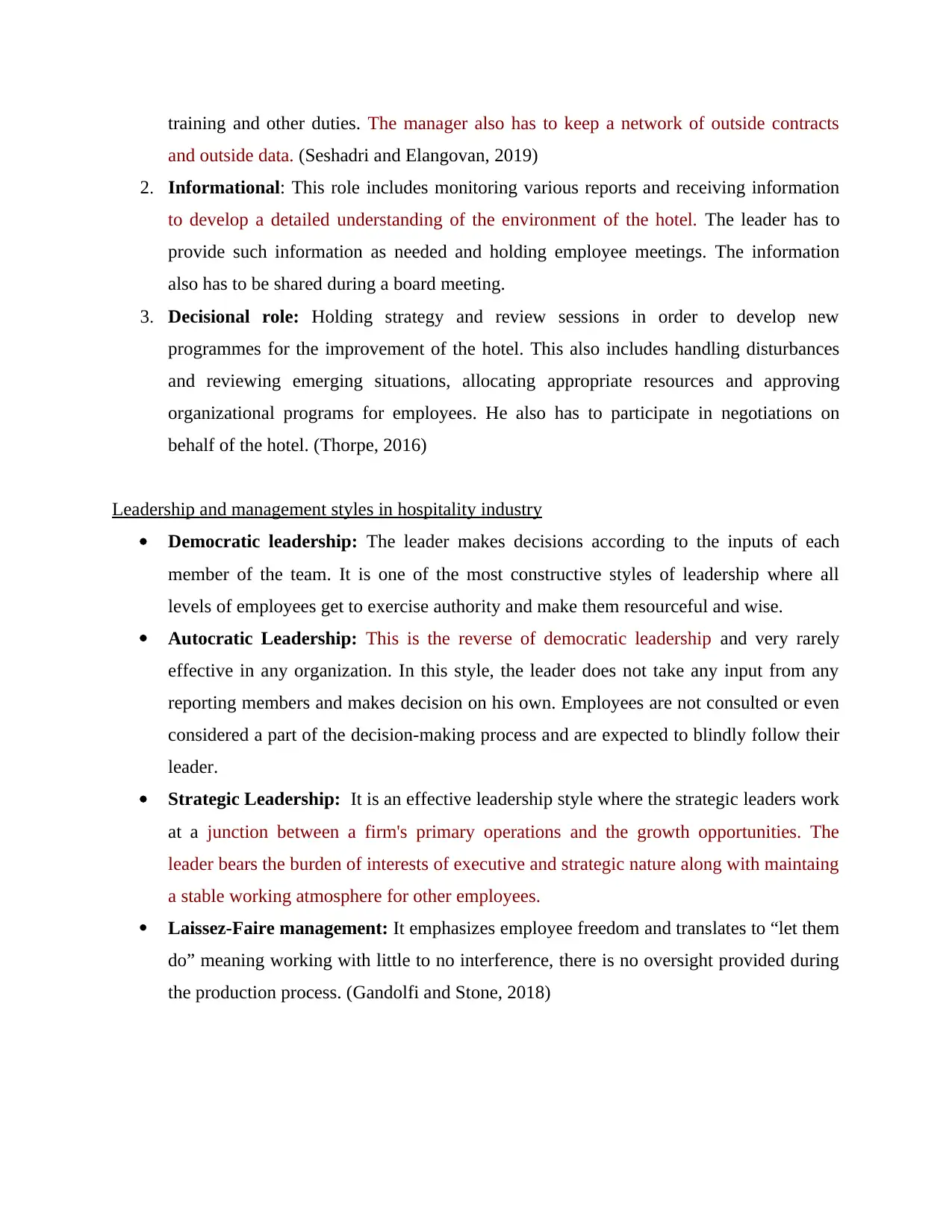
training and other duties. The manager also has to keep a network of outside contracts
and outside data. (Seshadri and Elangovan, 2019)
2. Informational: This role includes monitoring various reports and receiving information
to develop a detailed understanding of the environment of the hotel. The leader has to
provide such information as needed and holding employee meetings. The information
also has to be shared during a board meeting.
3. Decisional role: Holding strategy and review sessions in order to develop new
programmes for the improvement of the hotel. This also includes handling disturbances
and reviewing emerging situations, allocating appropriate resources and approving
organizational programs for employees. He also has to participate in negotiations on
behalf of the hotel. (Thorpe, 2016)
Leadership and management styles in hospitality industry
Democratic leadership: The leader makes decisions according to the inputs of each
member of the team. It is one of the most constructive styles of leadership where all
levels of employees get to exercise authority and make them resourceful and wise.
Autocratic Leadership: This is the reverse of democratic leadership and very rarely
effective in any organization. In this style, the leader does not take any input from any
reporting members and makes decision on his own. Employees are not consulted or even
considered a part of the decision-making process and are expected to blindly follow their
leader.
Strategic Leadership: It is an effective leadership style where the strategic leaders work
at a junction between a firm's primary operations and the growth opportunities. The
leader bears the burden of interests of executive and strategic nature along with maintaing
a stable working atmosphere for other employees.
Laissez-Faire management: It emphasizes employee freedom and translates to “let them
do” meaning working with little to no interference, there is no oversight provided during
the production process. (Gandolfi and Stone, 2018)
and outside data. (Seshadri and Elangovan, 2019)
2. Informational: This role includes monitoring various reports and receiving information
to develop a detailed understanding of the environment of the hotel. The leader has to
provide such information as needed and holding employee meetings. The information
also has to be shared during a board meeting.
3. Decisional role: Holding strategy and review sessions in order to develop new
programmes for the improvement of the hotel. This also includes handling disturbances
and reviewing emerging situations, allocating appropriate resources and approving
organizational programs for employees. He also has to participate in negotiations on
behalf of the hotel. (Thorpe, 2016)
Leadership and management styles in hospitality industry
Democratic leadership: The leader makes decisions according to the inputs of each
member of the team. It is one of the most constructive styles of leadership where all
levels of employees get to exercise authority and make them resourceful and wise.
Autocratic Leadership: This is the reverse of democratic leadership and very rarely
effective in any organization. In this style, the leader does not take any input from any
reporting members and makes decision on his own. Employees are not consulted or even
considered a part of the decision-making process and are expected to blindly follow their
leader.
Strategic Leadership: It is an effective leadership style where the strategic leaders work
at a junction between a firm's primary operations and the growth opportunities. The
leader bears the burden of interests of executive and strategic nature along with maintaing
a stable working atmosphere for other employees.
Laissez-Faire management: It emphasizes employee freedom and translates to “let them
do” meaning working with little to no interference, there is no oversight provided during
the production process. (Gandolfi and Stone, 2018)
Paraphrase This Document
Need a fresh take? Get an instant paraphrase of this document with our AI Paraphraser
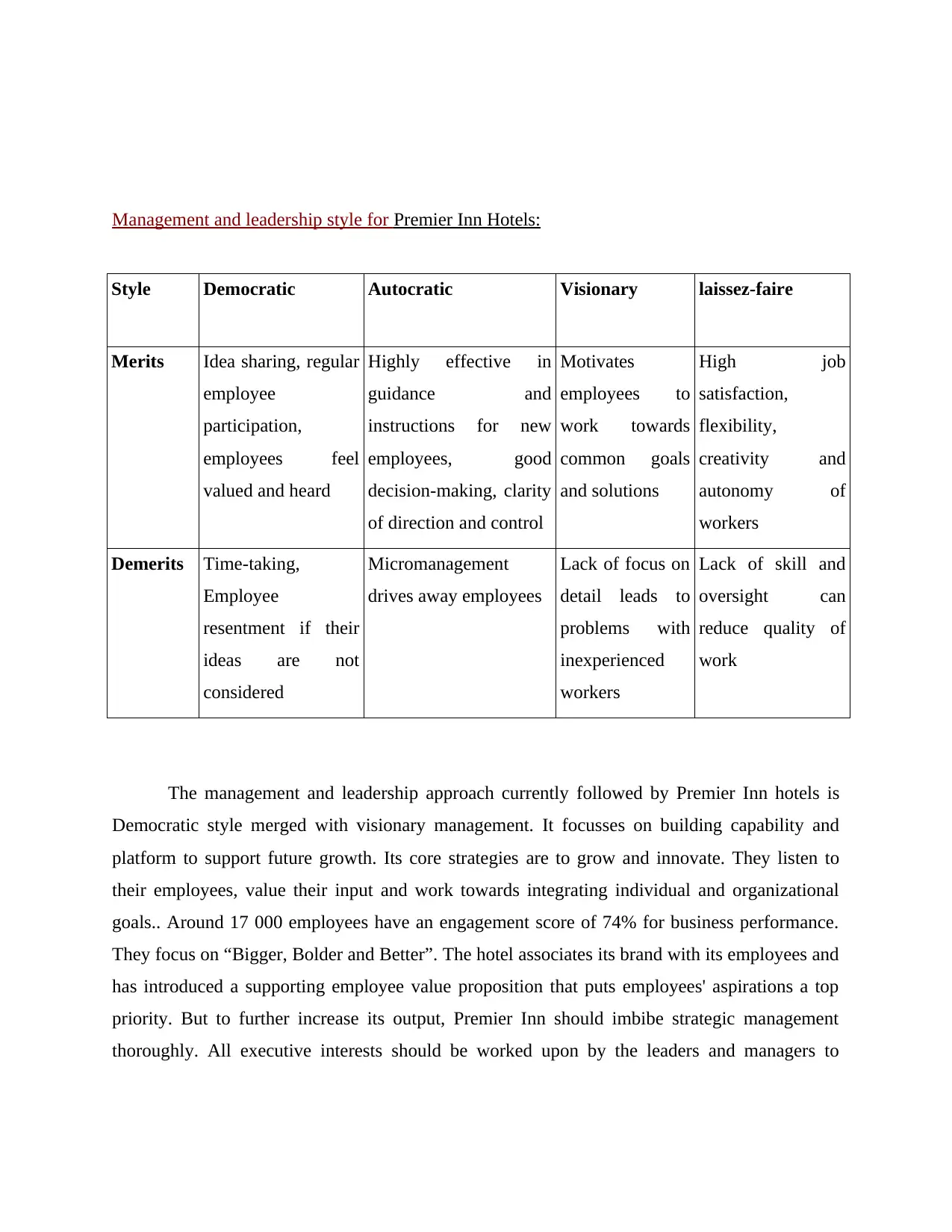
Management and leadership style for Premier Inn Hotels:
Style Democratic Autocratic Visionary laissez-faire
Merits Idea sharing, regular
employee
participation,
employees feel
valued and heard
Highly effective in
guidance and
instructions for new
employees, good
decision-making, clarity
of direction and control
Motivates
employees to
work towards
common goals
and solutions
High job
satisfaction,
flexibility,
creativity and
autonomy of
workers
Demerits Time-taking,
Employee
resentment if their
ideas are not
considered
Micromanagement
drives away employees
Lack of focus on
detail leads to
problems with
inexperienced
workers
Lack of skill and
oversight can
reduce quality of
work
The management and leadership approach currently followed by Premier Inn hotels is
Democratic style merged with visionary management. It focusses on building capability and
platform to support future growth. Its core strategies are to grow and innovate. They listen to
their employees, value their input and work towards integrating individual and organizational
goals.. Around 17 000 employees have an engagement score of 74% for business performance.
They focus on “Bigger, Bolder and Better”. The hotel associates its brand with its employees and
has introduced a supporting employee value proposition that puts employees' aspirations a top
priority. But to further increase its output, Premier Inn should imbibe strategic management
thoroughly. All executive interests should be worked upon by the leaders and managers to
Style Democratic Autocratic Visionary laissez-faire
Merits Idea sharing, regular
employee
participation,
employees feel
valued and heard
Highly effective in
guidance and
instructions for new
employees, good
decision-making, clarity
of direction and control
Motivates
employees to
work towards
common goals
and solutions
High job
satisfaction,
flexibility,
creativity and
autonomy of
workers
Demerits Time-taking,
Employee
resentment if their
ideas are not
considered
Micromanagement
drives away employees
Lack of focus on
detail leads to
problems with
inexperienced
workers
Lack of skill and
oversight can
reduce quality of
work
The management and leadership approach currently followed by Premier Inn hotels is
Democratic style merged with visionary management. It focusses on building capability and
platform to support future growth. Its core strategies are to grow and innovate. They listen to
their employees, value their input and work towards integrating individual and organizational
goals.. Around 17 000 employees have an engagement score of 74% for business performance.
They focus on “Bigger, Bolder and Better”. The hotel associates its brand with its employees and
has introduced a supporting employee value proposition that puts employees' aspirations a top
priority. But to further increase its output, Premier Inn should imbibe strategic management
thoroughly. All executive interests should be worked upon by the leaders and managers to
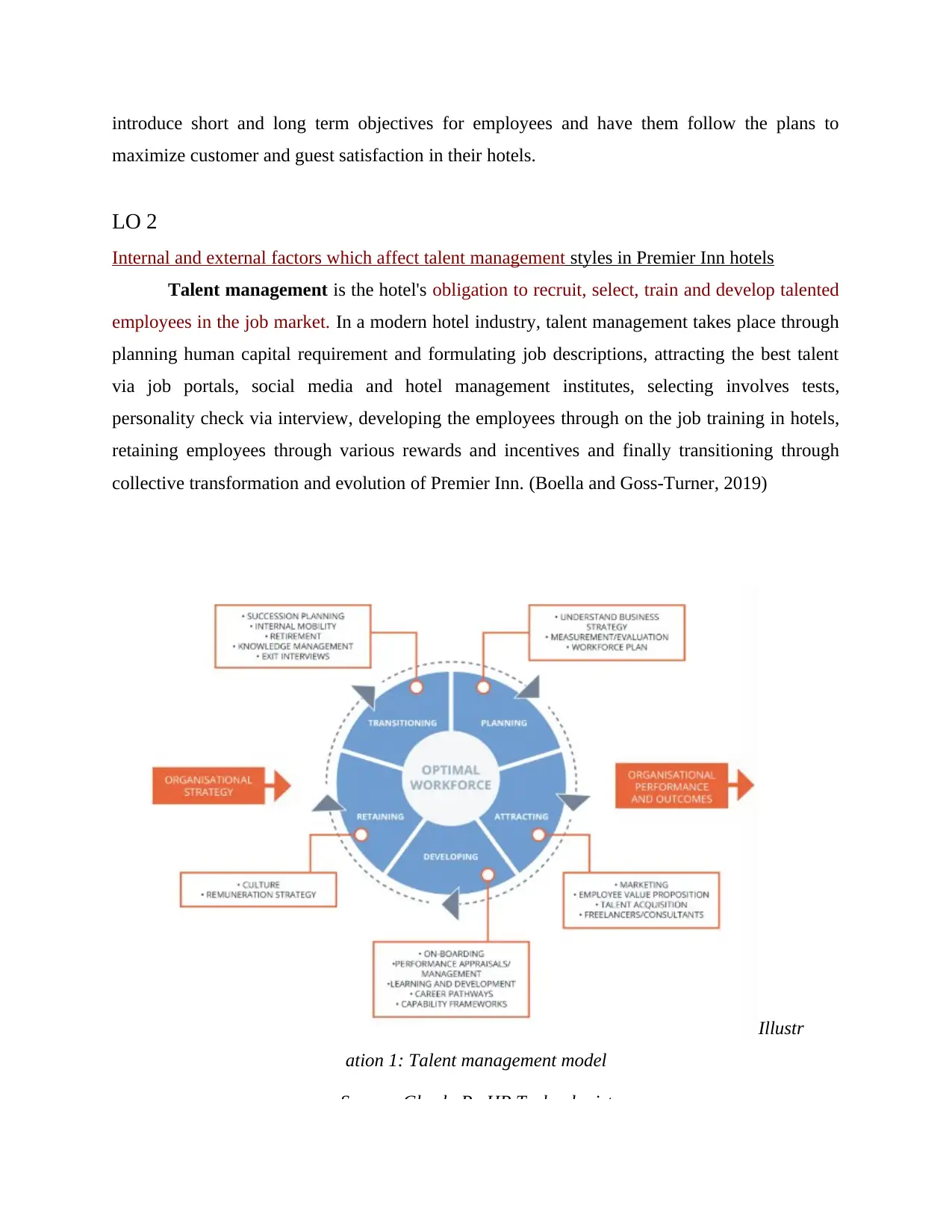
introduce short and long term objectives for employees and have them follow the plans to
maximize customer and guest satisfaction in their hotels.
LO 2
Internal and external factors which affect talent management styles in Premier Inn hotels
Talent management is the hotel's obligation to recruit, select, train and develop talented
employees in the job market. In a modern hotel industry, talent management takes place through
planning human capital requirement and formulating job descriptions, attracting the best talent
via job portals, social media and hotel management institutes, selecting involves tests,
personality check via interview, developing the employees through on the job training in hotels,
retaining employees through various rewards and incentives and finally transitioning through
collective transformation and evolution of Premier Inn. (Boella and Goss-Turner, 2019)
Illustr
ation 1: Talent management model
Source: Ghosh, P., HR Technologist
maximize customer and guest satisfaction in their hotels.
LO 2
Internal and external factors which affect talent management styles in Premier Inn hotels
Talent management is the hotel's obligation to recruit, select, train and develop talented
employees in the job market. In a modern hotel industry, talent management takes place through
planning human capital requirement and formulating job descriptions, attracting the best talent
via job portals, social media and hotel management institutes, selecting involves tests,
personality check via interview, developing the employees through on the job training in hotels,
retaining employees through various rewards and incentives and finally transitioning through
collective transformation and evolution of Premier Inn. (Boella and Goss-Turner, 2019)
Illustr
ation 1: Talent management model
Source: Ghosh, P., HR Technologist
⊘ This is a preview!⊘
Do you want full access?
Subscribe today to unlock all pages.

Trusted by 1+ million students worldwide
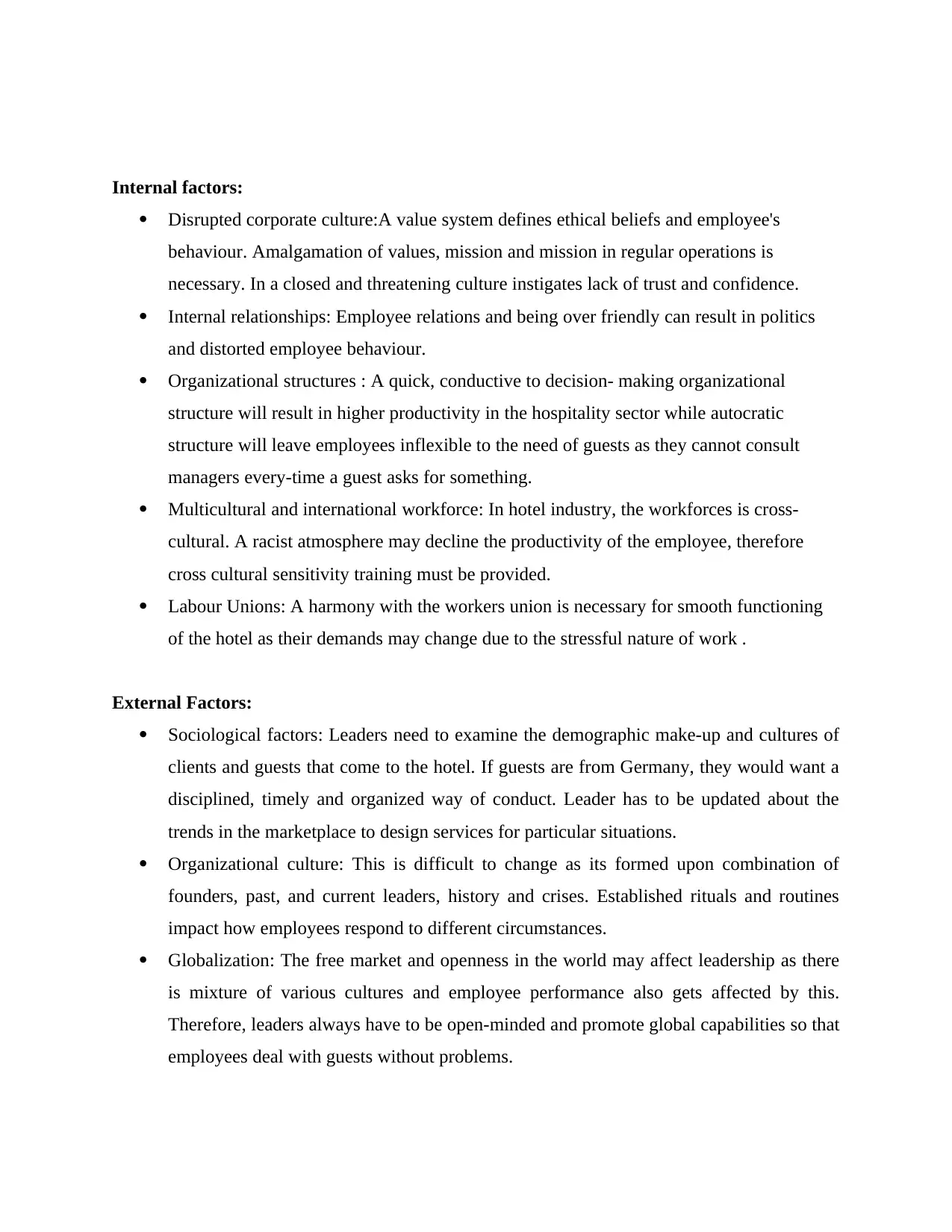
Internal factors:
Disrupted corporate culture:A value system defines ethical beliefs and employee's
behaviour. Amalgamation of values, mission and mission in regular operations is
necessary. In a closed and threatening culture instigates lack of trust and confidence.
Internal relationships: Employee relations and being over friendly can result in politics
and distorted employee behaviour.
Organizational structures : A quick, conductive to decision- making organizational
structure will result in higher productivity in the hospitality sector while autocratic
structure will leave employees inflexible to the need of guests as they cannot consult
managers every-time a guest asks for something.
Multicultural and international workforce: In hotel industry, the workforces is cross-
cultural. A racist atmosphere may decline the productivity of the employee, therefore
cross cultural sensitivity training must be provided.
Labour Unions: A harmony with the workers union is necessary for smooth functioning
of the hotel as their demands may change due to the stressful nature of work .
External Factors:
Sociological factors: Leaders need to examine the demographic make-up and cultures of
clients and guests that come to the hotel. If guests are from Germany, they would want a
disciplined, timely and organized way of conduct. Leader has to be updated about the
trends in the marketplace to design services for particular situations.
Organizational culture: This is difficult to change as its formed upon combination of
founders, past, and current leaders, history and crises. Established rituals and routines
impact how employees respond to different circumstances.
Globalization: The free market and openness in the world may affect leadership as there
is mixture of various cultures and employee performance also gets affected by this.
Therefore, leaders always have to be open-minded and promote global capabilities so that
employees deal with guests without problems.
Disrupted corporate culture:A value system defines ethical beliefs and employee's
behaviour. Amalgamation of values, mission and mission in regular operations is
necessary. In a closed and threatening culture instigates lack of trust and confidence.
Internal relationships: Employee relations and being over friendly can result in politics
and distorted employee behaviour.
Organizational structures : A quick, conductive to decision- making organizational
structure will result in higher productivity in the hospitality sector while autocratic
structure will leave employees inflexible to the need of guests as they cannot consult
managers every-time a guest asks for something.
Multicultural and international workforce: In hotel industry, the workforces is cross-
cultural. A racist atmosphere may decline the productivity of the employee, therefore
cross cultural sensitivity training must be provided.
Labour Unions: A harmony with the workers union is necessary for smooth functioning
of the hotel as their demands may change due to the stressful nature of work .
External Factors:
Sociological factors: Leaders need to examine the demographic make-up and cultures of
clients and guests that come to the hotel. If guests are from Germany, they would want a
disciplined, timely and organized way of conduct. Leader has to be updated about the
trends in the marketplace to design services for particular situations.
Organizational culture: This is difficult to change as its formed upon combination of
founders, past, and current leaders, history and crises. Established rituals and routines
impact how employees respond to different circumstances.
Globalization: The free market and openness in the world may affect leadership as there
is mixture of various cultures and employee performance also gets affected by this.
Therefore, leaders always have to be open-minded and promote global capabilities so that
employees deal with guests without problems.
Paraphrase This Document
Need a fresh take? Get an instant paraphrase of this document with our AI Paraphraser
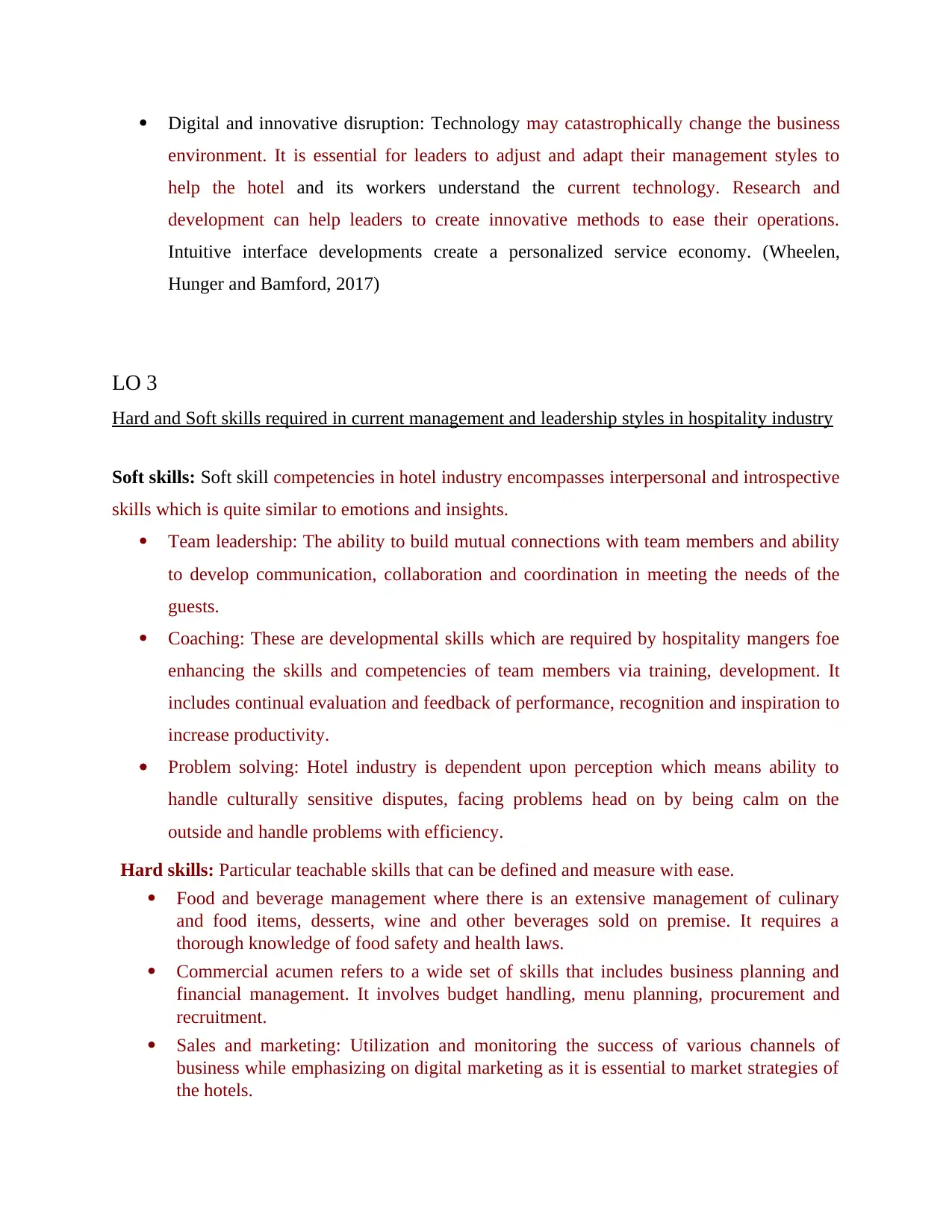
Digital and innovative disruption: Technology may catastrophically change the business
environment. It is essential for leaders to adjust and adapt their management styles to
help the hotel and its workers understand the current technology. Research and
development can help leaders to create innovative methods to ease their operations.
Intuitive interface developments create a personalized service economy. (Wheelen,
Hunger and Bamford, 2017)
LO 3
Hard and Soft skills required in current management and leadership styles in hospitality industry
Soft skills: Soft skill competencies in hotel industry encompasses interpersonal and introspective
skills which is quite similar to emotions and insights.
Team leadership: The ability to build mutual connections with team members and ability
to develop communication, collaboration and coordination in meeting the needs of the
guests.
Coaching: These are developmental skills which are required by hospitality mangers foe
enhancing the skills and competencies of team members via training, development. It
includes continual evaluation and feedback of performance, recognition and inspiration to
increase productivity.
Problem solving: Hotel industry is dependent upon perception which means ability to
handle culturally sensitive disputes, facing problems head on by being calm on the
outside and handle problems with efficiency.
Hard skills: Particular teachable skills that can be defined and measure with ease.
Food and beverage management where there is an extensive management of culinary
and food items, desserts, wine and other beverages sold on premise. It requires a
thorough knowledge of food safety and health laws.
Commercial acumen refers to a wide set of skills that includes business planning and
financial management. It involves budget handling, menu planning, procurement and
recruitment.
Sales and marketing: Utilization and monitoring the success of various channels of
business while emphasizing on digital marketing as it is essential to market strategies of
the hotels.
environment. It is essential for leaders to adjust and adapt their management styles to
help the hotel and its workers understand the current technology. Research and
development can help leaders to create innovative methods to ease their operations.
Intuitive interface developments create a personalized service economy. (Wheelen,
Hunger and Bamford, 2017)
LO 3
Hard and Soft skills required in current management and leadership styles in hospitality industry
Soft skills: Soft skill competencies in hotel industry encompasses interpersonal and introspective
skills which is quite similar to emotions and insights.
Team leadership: The ability to build mutual connections with team members and ability
to develop communication, collaboration and coordination in meeting the needs of the
guests.
Coaching: These are developmental skills which are required by hospitality mangers foe
enhancing the skills and competencies of team members via training, development. It
includes continual evaluation and feedback of performance, recognition and inspiration to
increase productivity.
Problem solving: Hotel industry is dependent upon perception which means ability to
handle culturally sensitive disputes, facing problems head on by being calm on the
outside and handle problems with efficiency.
Hard skills: Particular teachable skills that can be defined and measure with ease.
Food and beverage management where there is an extensive management of culinary
and food items, desserts, wine and other beverages sold on premise. It requires a
thorough knowledge of food safety and health laws.
Commercial acumen refers to a wide set of skills that includes business planning and
financial management. It involves budget handling, menu planning, procurement and
recruitment.
Sales and marketing: Utilization and monitoring the success of various channels of
business while emphasizing on digital marketing as it is essential to market strategies of
the hotels.
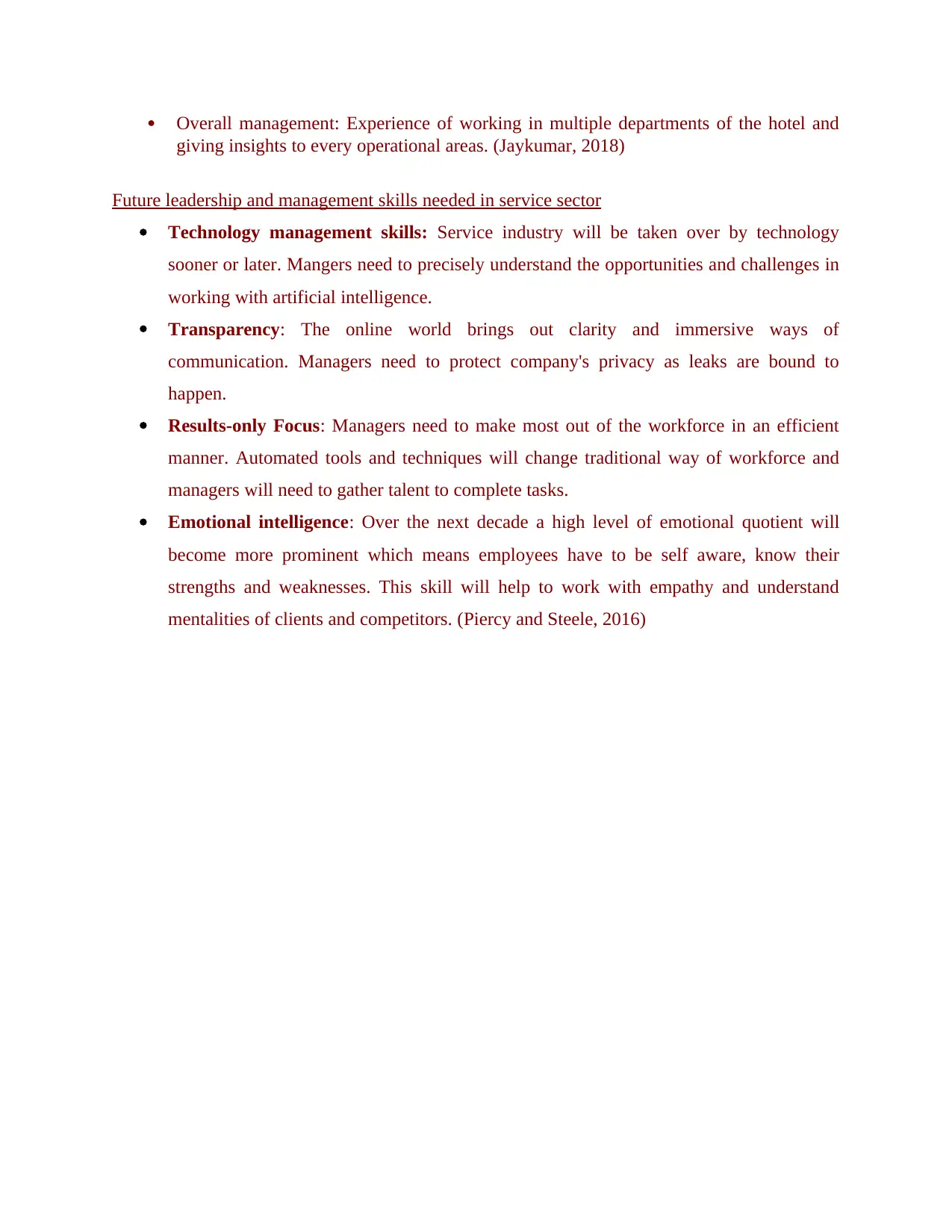
Overall management: Experience of working in multiple departments of the hotel and
giving insights to every operational areas. (Jaykumar, 2018)
Future leadership and management skills needed in service sector
Technology management skills: Service industry will be taken over by technology
sooner or later. Mangers need to precisely understand the opportunities and challenges in
working with artificial intelligence.
Transparency: The online world brings out clarity and immersive ways of
communication. Managers need to protect company's privacy as leaks are bound to
happen.
Results-only Focus: Managers need to make most out of the workforce in an efficient
manner. Automated tools and techniques will change traditional way of workforce and
managers will need to gather talent to complete tasks.
Emotional intelligence: Over the next decade a high level of emotional quotient will
become more prominent which means employees have to be self aware, know their
strengths and weaknesses. This skill will help to work with empathy and understand
mentalities of clients and competitors. (Piercy and Steele, 2016)
giving insights to every operational areas. (Jaykumar, 2018)
Future leadership and management skills needed in service sector
Technology management skills: Service industry will be taken over by technology
sooner or later. Mangers need to precisely understand the opportunities and challenges in
working with artificial intelligence.
Transparency: The online world brings out clarity and immersive ways of
communication. Managers need to protect company's privacy as leaks are bound to
happen.
Results-only Focus: Managers need to make most out of the workforce in an efficient
manner. Automated tools and techniques will change traditional way of workforce and
managers will need to gather talent to complete tasks.
Emotional intelligence: Over the next decade a high level of emotional quotient will
become more prominent which means employees have to be self aware, know their
strengths and weaknesses. This skill will help to work with empathy and understand
mentalities of clients and competitors. (Piercy and Steele, 2016)
⊘ This is a preview!⊘
Do you want full access?
Subscribe today to unlock all pages.

Trusted by 1+ million students worldwide
1 out of 15
Related Documents
Your All-in-One AI-Powered Toolkit for Academic Success.
+13062052269
info@desklib.com
Available 24*7 on WhatsApp / Email
![[object Object]](/_next/static/media/star-bottom.7253800d.svg)
Unlock your academic potential
Copyright © 2020–2026 A2Z Services. All Rights Reserved. Developed and managed by ZUCOL.




